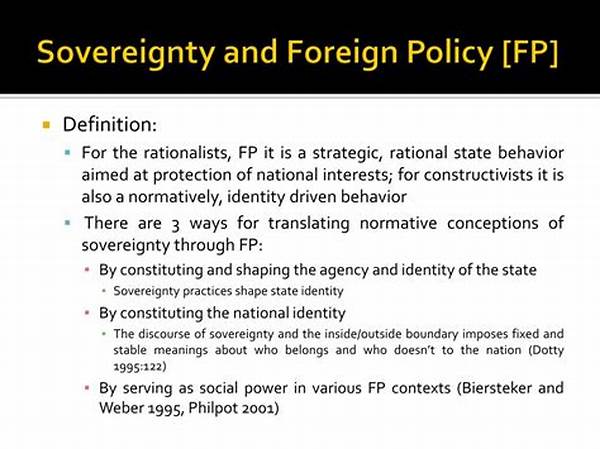The Interplay Between Foreign Policy and Sovereignty
Foreign policy and sovereignty are intricately linked components of a nation’s governance framework. Foreign policy represents the strategies set by a state to protect its national interests and achieve goals in international relations. Sovereignty, on the other hand, refers to the supreme power or authority that a state possesses within its territory without external interference. The intersection of foreign policy and sovereignty is evident as countries strive to maintain their autonomy while engaging globally.
In the contemporary world, foreign policy decisions are often influenced by the concept of sovereignty. Governments are required to balance international cooperation with the need to safeguard their national sovereignty. This balance ensures that a nation is open to globalization while still retaining control over its internal affairs. The encroachment on sovereignty due to international agreements and alliances necessitates astute foreign policy planning.
The challenges of integrating foreign policy with sovereignty become more pronounced due to globalization and international laws. As global interdependence increases, states must navigate through diplomatic channels, adapting their foreign policy to protect their sovereignty. The ability to influence international norms and decisions while maintaining sovereign rights is a critical function of modern statesmanship.
Challenges in Balancing Foreign Policy and Sovereignty
1. Globalization Pressure: Nations often face pressure from global entities that may impact their sovereignty. Flexible foreign policy is essential for managing these pressures without sacrificing national autonomy.
2. International Law Compliance: Adhering to international regulations can sometimes conflict with a country’s sovereignty. A robust foreign policy can mitigate these conflicts through diplomatic negotiations.
3. Diplomatic Relations: Building and maintaining diplomatic ties is crucial for foreign policy. However, it must not compromise sovereignty, necessitating skillful diplomacy.
4. Economic Agreements: Economic pacts with other nations involve compromises, impacting sovereignty. Effective foreign policy enables maximizing benefits while preserving sovereignty.
5. Security Concerns: Addressing threats requires cooperation with other nations, which can impinge on sovereignty. Foreign policy must seamlessly integrate international cooperation with national security priorities.
Historical Perspectives on Foreign Policy and Sovereignty
Throughout history, the concepts of foreign policy and sovereignty have evolved in tandem. During the Westphalian era, sovereignty was predominantly concerned with a state’s territorial integrity and non-interference. As states began engaging more actively in international politics, foreign policy strategies adapted to the changing global landscape, balancing interaction and independence.
In the 20th century, with the rise of supranational entities like the United Nations, the tension between foreign policy and sovereignty became more complex. While states retained sovereignty, their foreign policies began integrating aspects of global governance. This illustrated a shift towards a new paradigm where sovereignty was no longer solely about territorial control but also about influencing global policy through strategic foreign policy maneuvers.
The Modern Context of Foreign Policy and Sovereignty
In contemporary discourse, foreign policy and sovereignty increasingly account for global connectivity and interdependence. The emergence of global challenges such as climate change, terrorism, and pandemics has necessitated collaborative international responses, which foreign policies must accommodate while respecting sovereignty. Thus, modern states craft foreign policies that respect international norms yet safeguard their sovereign interests.
Digital technology and cyber diplomacy have further complicated the relationship between foreign policy and sovereignty. Cyber threats transcending borders require sophisticated foreign policy approaches ensuring cyber sovereignty is maintained. As cyber diplomacy evolves, foreign policy must consistently protect national digital infrastructure without compromising international cooperation efforts.
Future Prospects in Foreign Policy and Sovereignty
As global dynamics continue to shift, future foreign policy will likely involve more inclusive and multilateral approaches. Diplomacies must evolve to protect sovereignty amid changing geopolitical climates. Anticipating global trends will be a focal point of future foreign policies, ensuring no encroachments on a nation’s sovereignty while fostering global collaboration.
A forward-looking foreign policy must integrate innovative solutions to uphold sovereignty in the face of environmental challenges and technological advancements. Mechanisms to monitor evolving international phenomena will be pivotal, establishing robust foreign policies that preserve sovereignty while embracing global progress.
Conclusion: Ensuring Sovereignty through Adaptive Foreign Policy
In conclusion, the relationship between foreign policy and sovereignty remains a foundational aspect of statecraft. Amidst an interconnected world, countries must devise foreign policies that protect their sovereignty while engaging constructively on the global stage. Strategic foresight and adaptive policies are essential to navigate the complex landscape of international relations.
Foreign policy should aim for a balance that not only enhances diplomatic relations and economic growth but also reinforces national sovereignty. By prioritizing sovereignty, states can ensure their domestic stability while playing pivotal roles in shaping global policies. This careful balance is imperative for nation-states to prosper in an increasingly interconnected global environment.





